Winning more clients is exciting – until you realize each new project adds a layer of chaos. One client wants every update by phone, another buries you in email chains, and a third expects you to remember every detail from a meeting six months ago. Without a system to keep it all straight, the work that should grow your business starts draining your focus.
Fortunately, that chaos is manageable with the right client management software. The harder part is choosing one when the market is crowded with options. That’s what we’ll break down today.
What to look for in client management software
You can’t drop the ball when it comes to your business, especially when it comes to paying clients. The right software helps you avoid that by handling the details you can’t keep in your head.
Here are the features that make it possible:
- A single client record that tells the whole story. When a client calls out of the blue, you shouldn’t be scrambling for details. A proper client record ties together contact info, past conversations, proposals, invoices, and even those quick notes you jotted down after a meeting.
- Conversation history that saves you from “remind me where we left off?” Clients hate repeating themselves. With a full history, you can jump back into a paused project as if their last call was yesterday.
- Pipelines that mirror your real relationships. Not every client is a “deal.” Some are long-term retainers, others are one-off projects. A flexible pipeline lets you see where each relationship stands and who needs attention now.
- Reminders that protect renewals and goodwill. A single missed renewal email can cost you a contract. Automated reminders tied to clients make sure you never lose business because you forgot to check in.
- Context on the go. In client management, half the work happens outside the office: at sites, on calls, in coffee shops. A mobile app that syncs instantly means you can update a record before you even get back to your desk.
- Integrations that keep money and messages in sync. When invoices, emails, and project updates all connect back to the client record, you cut down on errors and look more professional in every interaction.
These features are non-negotiable if you want software that truly supports client relationships. But they’re not the whole picture. You’ll also need to weigh things like pricing, ease of setup, and how well a tool fits into your existing workflow. With that in mind, let’s look at the best client management software options available in 2025.
The best client management software for relationship and project management in 2025
Capsule CRM
Capsule CRM is designed to feel effortless from the start.
It gives you a clear view of your contacts and sales pipeline without overwhelming you with features you’ll never use.
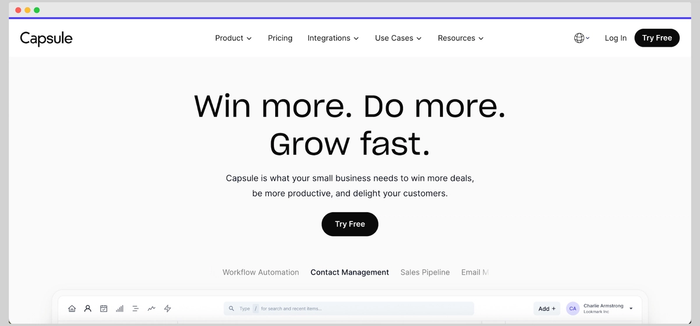
Adding new clients or tracking sales operations takes only a few clicks, so your team spends more time with clients and less time figuring out software. For small businesses, it’s an efficient way to stay organized and still benefit from smart touches like workflow automation and integrations.
Features that make client management a breeze
- Sales pipeline in Kanban view: move deals through stages with a simple drag-and-drop. You always know which opportunities are moving forward and which need attention.
- Custom dashboards: track the metrics that matter to your business, from conversion rates to team activity, without getting through complicated reports.
- Workflow automation (Tracks): set Capsule to handle routine follow-ups for you. For example, if a lead goes quiet for five days, Capsule can automatically schedule a reminder email and a task to check in.
- Contact management with enrichment: keep every client detail in one place, searchable in seconds. Even if you only know a company name, Capsule can help fill in missing data so outreach stays effortless.
- Integrated email tools: connect directly with Gmail or Outlook to send templates or log messages. With the Transpond integration, you can also segment contacts and run simple automated campaigns.
Pricing: starts at $18 per user per month, and there is a free plan available
Capsule isn’t just easy on paper: real users back it up. Jamie D., a web developer who’s relied on Capsule for more than a decade, calls it “user-friendly and rapidly improving” and highlights how the tool makes staying on top of opportunities and projects effortless.
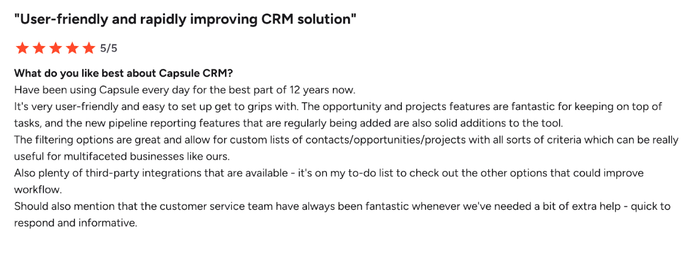
He also points to the flexible filtering options, steady stream of new features, and responsive support team as reasons his small business sticks with Capsule year after year.
Monday Sales CRM
Monday Sales CRM is all about flexibility. Instead of forcing you into rigid sales pipelines, it gives you a board-based system you can shape around the way your team actually works.
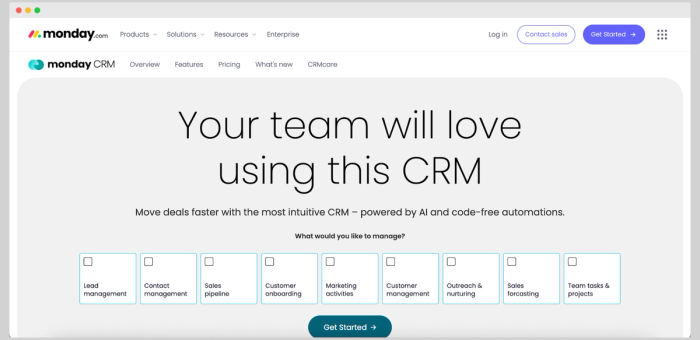
For businesses that want client management and project management in one place, it feels like a natural fit.
Features
- Customizable boards: build your own workflow from scratch. Whether you’re tracking deals or managing delivery, the board adapts to your process.
- Automations: cut down on busywork with trigger-based actions.
- Multiple views: switch between views depending on what you need – a high-level overview or deadline-level detail.
- Proofing tools: leave comments directly on files and designs, so review cycles move faster.
Pricing: from $12 per user/month for the Basic plan.
Read more about Monday CRM pricing.
While powerful, Monday does have a drawback: support can feel limited if you hit a technical roadblock during setup.
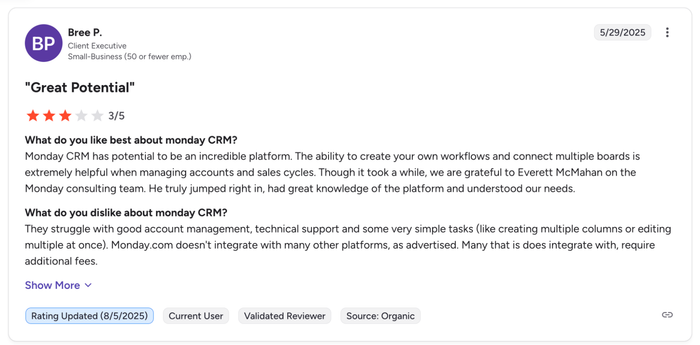
Zoho CRM
Zoho CRM is part of a larger ecosystem, which makes it especially appealing if you’re already running tools like Zoho Desk, Projects, Campaigns, or Mail.
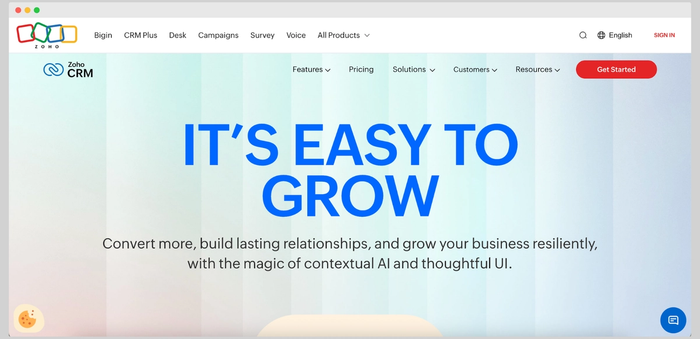
Everything can be integrated into one dashboard, so sales and marketing can work from the same source of truth. For teams that value automation and end-to-end visibility, Zoho offers a lot of firepower without forcing you to stitch together different platforms.
Features
- Multi‑contact accounts make it easy to manage customer interactions when you have multiple contacts at one organization.
- Quote & invoice generation from inside the CRM will make sure that every offer is followed up with a quote and/or invoice.
- Workflow automation lets you create and manage recurring tasks and schedule activities so you don't accidentally forget to follow up or check up on.
- Zoho Projects integration allows departments to easily collaborate with each other.
Pricing: starts at $14 per user per month for the Standard plan
Although powerful, you may find Zoho a bit dated in terms of UI and UX, which is a recurring theme in Zoho products:
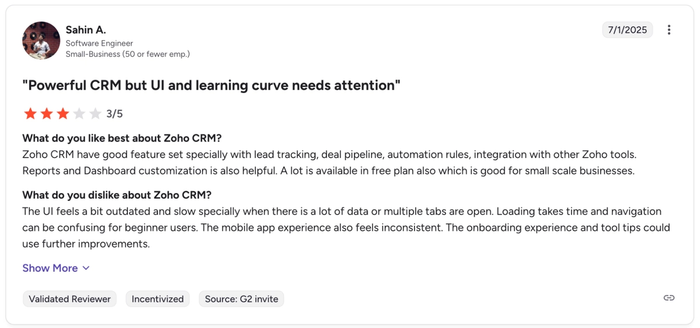
Pipedrive
Pipedrive is a CRM built by salespeople, for salespeople, and it shows.
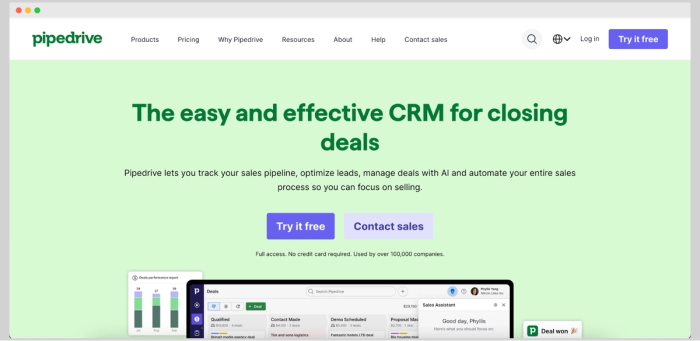
Its core strength is a visual pipeline that makes it obvious where every deal stands. Pipedrive offers small businesses a simple dashboard to manage follow-ups and maintain revenue.
Features
- Drag-and-drop sales board: track deals visually without advanced sales analytics.
- Smart reminders: get nudges for follow-ups so opportunities never go cold.
- Forecasting & reporting: predict pipeline performance by analyzing past data and adjust strategy when you’re off pace.
- 500+ integrations: connect Pipedrive with the invoicing, marketing, communication, or project tools your team already uses.
Pricing: from €14 per user/month (Lite plan, billed annually).
Pipedrive shines in its simplicity. But if you’re looking for deeper functionality, you may find those features less refined than dedicated platforms.
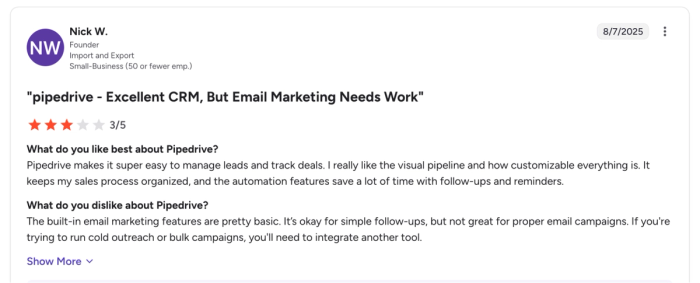
HubSpot
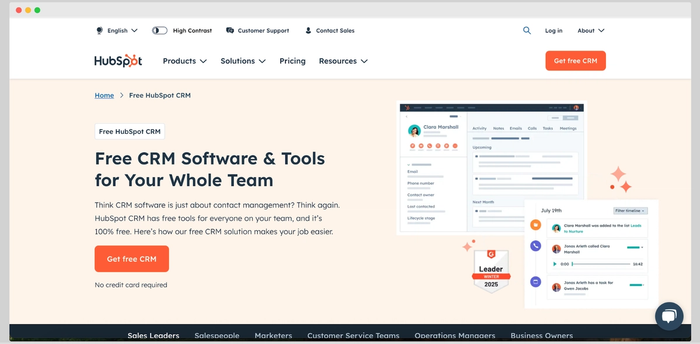
HubSpot CRM has become the go-to starting point for many small teams because it delivers plenty of value before you ever pay a cent. The free plan covers enough to get a small business running on a professional system. As you scale, HubSpot lets you plug in various elements to build a full customer platform.
Features
- Shared inbox & contact management: keep every email and call tied to the right client, so your team always knows what’s been said and by whom.
- Deal tracking: see how many opportunities are open and where they are in the pipeline.
- Dashboard reporting: you get a high-level view of performance and activity across accounts, even in the free CRM plan.
- Modular tool stack: expand beyond CRM with add-on hubs.
Pricing: free forever for the base CRM; paid plans start at $9/seat/month for the Starter Customer Platform.
The trade-off? While the free plan is generous, HubSpot can get pricey as your team grows and you start adding advanced features.
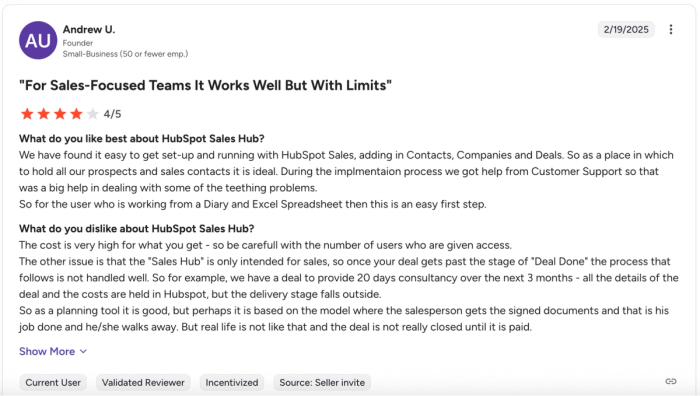
Insightly
Insightly stands out because it doesn’t stop at sales – it helps manage what comes after.
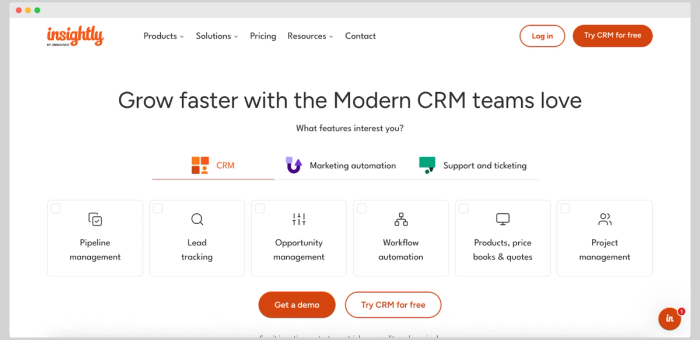
For agencies, consultants, and service-based businesses, it’s a true “lifecycle CRM” that gives users a single place to handle sales and client communication.
Features
- Project tracking lets you link sales opportunities to delivery tasks without leaving the CRM.
- Automation lets you save time by setting up triggers for tasks that matter to you. You can define a trigger and assign one or more automated actions.
- Ticket management allows agents to manage client issues and respond directly in the CRM. When customers reach out, Insightly automatically creates a ticket that stores all the client communication history.
- Custom alerts remind teams of deadlines or key updates relevant for your unique sales process.
Pricing: free for up to two users; paid plans start at $29 per user per month for the Plus plan
The problem with Insightly is that to get access to all of the powerful features, you need to go through a lengthy learning phase:
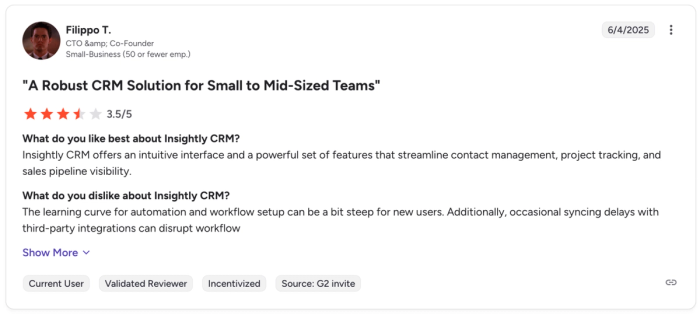
Keap
Most CRMs stop at contact management. Keap keeps going: it handles the messy parts of running a service business – scheduling, billing, and routine follow-ups – alongside your sales pipeline.
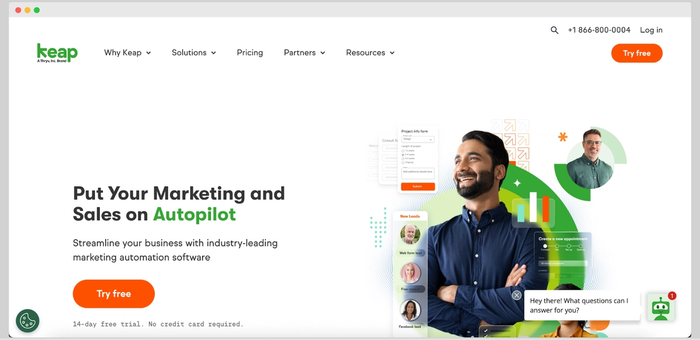
Features
- Contact management: keep every client conversation in one place for full context and clarity for your team.
- Calendar booking: let clients self-schedule with just a few clicks, cutting out the usual email back-and-forth.
- Financial management: create sales invoices and accept payments directly in Keap.
- Automation sequences: set up workflows for repetitive tasks, such as sending welcome emails or triggering reminders after sign-up.
Pricing: starts at $249/month for two users and up to 1,500 contacts.
Keap’s is a convenient all in one platform that can do it all. The flip side is cost: it’s significantly more expensive than most CRMs, and many users flag pricing as the biggest drawback:
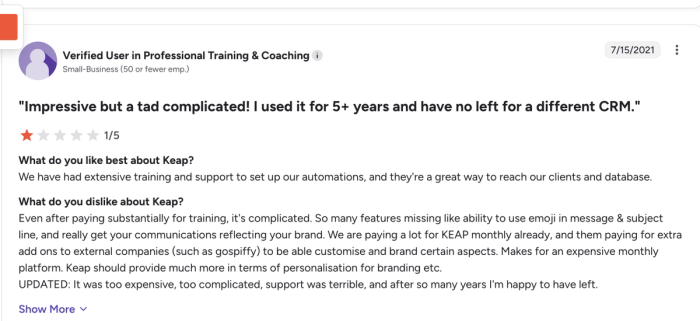
Zendesk
Zendesk Sell is the natural fit for teams already using Zendesk for customer support.
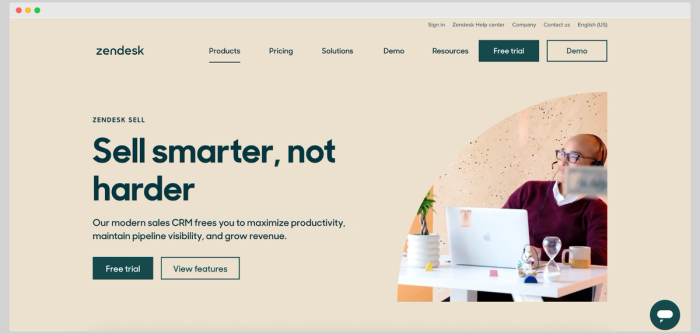
It brings sales into the same ecosystem, so reps and agents can work from a shared sales playbook. For companies that value continuity between landing a deal and keeping that client happy, Sell is a logical extension.
Features
- Sales overview: shape your pipeline to match the way your team actually sells.
- Forecasting tools with live dashboards: track revenue expectations and deal volume in real time, broken down by rep or sales stage, so leadership isn’t flying blind.
- Complex email integration: every sent or received email is automatically tied to the client record, with templates available right inside Gmail or Outlook.
- Trigger-based workflows: assign tasks or route leads on autopilot.
- Deep Zendesk integration: client context flows between sales and support, so a rep closing a deal and an agent handling a ticket see the same history.
Pricing: starts at $19 per user per month for Zendesk Sell Team
While Zendesk Sell delivers on integration, reviews often note it feels less polished than Zendesk’s core support tools. Bugs and slow support responses are recurring complaints:
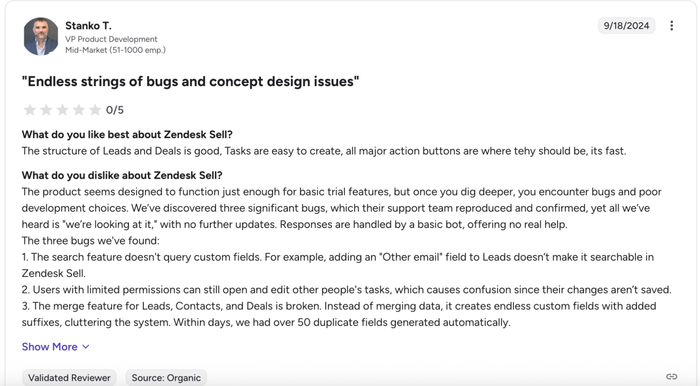
Freshsales
What happens when a client reaches out through one channel and your team misses the context from another? Freshsales prevents those gaps by pulling every interaction into a single view.
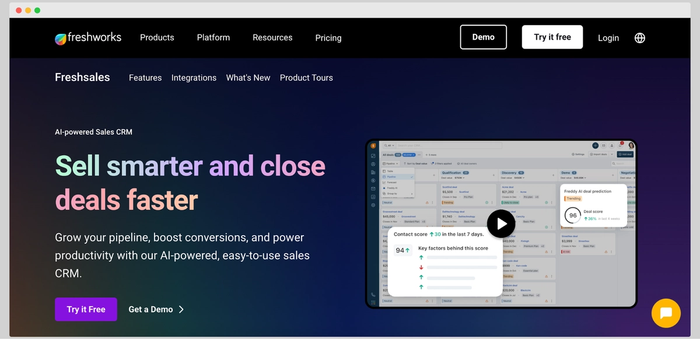
Built as a support-first CRM, it helps businesses respond quickly and keep sales and support on the same page.
Features
- Unified ticketing: instead of using separate inboxes, Freshsales places every client request in one queue for faster handoffs.
- Rule-based routing: create smart conditions that decide where tickets go. A subject line with “refund” can land directly with the refund team, while urgent cases jump straight to the priority list.
- All-channel visibility: conversations from email, chat, social, and phone flow into the same record, so your team sees the whole story instead of piecing it together from various tools.
- Built-in safeguards: with GDPR/HIPAA compliance, Freshsales includes the security layers needed in industries where data handling matters most.
Pricing: starts at $9 per user per month for the Growth plan
Freshsales gives strong support coverage at an accessible price point. But if your workflows require deep customization, expect to spend extra time configuring things manually:
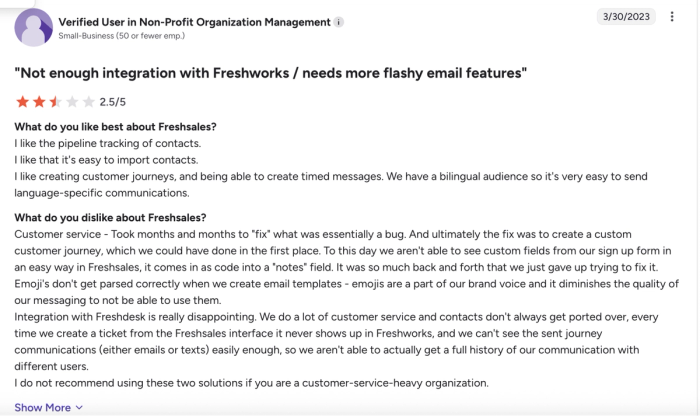
Get a client management tool that frees up time instead of creating more work
A bad client management platform will make you jump through hoops to learn all the advanced features and make it work for your use case. A great one helps you get more sales through the door and removes repetitive tasks standing in the way of your productivity.
If you're looking for the best client management software that can help you as soon as today, get Capsule. It's easy to use, has a generous free plan, and features to make your sales process as successful as possible.
Ready to spend more time building relationships and less time on admin?
Start with Capsule’s free plan today.



![Business statistics every business owner should know [2026]](https://cdn.sanity.io/images/poftgen7/production/5619faf6a65f53406d3e554c11c9e894402d4397-5760x3240.jpg?rect=5,0,5751,3240&w=300&h=169&q=75&fit=max&auto=format)
